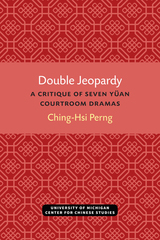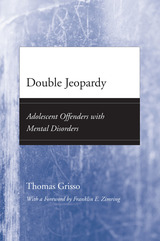2 books about Double Jeopardy

Double Jeopardy
A Critique of Seven Yüan Courtroom Dramas
Ching-Hsi Perng
University of Michigan Press, 1978
Traditionally, criticism of plays from the Yüan Dynasty (1260–1368) has been dominated by the so-called poetic and socialist schools. Double Jeopardy instead rigorously evaluates a group of plays by aesthetic criteria generated from within the works themselves. It examines seven courtroom plays with special attention to language and the manipulation of dramatic characters—undoubtedly the most reliable indicators of the playwright’s strength and craftsmanship in such a stylized art form as Yüan tsa-chü drama.
The analytical method adopted in Double Jeopardy is textual explication of the conventions of genre and the individual characteristics of each play. The innovation and creative vitality of each playwright emerges through close scrutiny of selected conventional aspects of courtroom dramas: the functions and placement patterns of lyric, verse, and prose as well as the custom of a single singing role and its implication for the presentation of dramatis personae.
Because Yüan drama is driven by conventions, Perng demonstrates a method that can be applied not just to judgment reversal plays but to Yüan dramatic criticism as a whole. In pursuing a method of textual explication, Perng provides a basis on which a larger framework of criticism of Yüan drama may be built.
[more]

Double Jeopardy
Adolescent Offenders with Mental Disorders
Thomas Grisso
University of Chicago Press, 2004
In the twenty-first-century world of juvenile justice policy and practice, nearly everyone agrees that one of the most pressing issues facing the nation's juvenile courts is their proper response to delinquent youths with mental disorders. Recent research indicates that about two-thirds of adolescent offenders in juvenile justice facilities meet the criteria for one or more mental disorders. What are the obligations of our juvenile justice system, then, as the caretaker for delinquent youth with such disabilities? How do issues of adolescent development create special challenges in determining the court's proper response to delinquents with special mental health needs? Thomas Grisso considers these questions while offering new information to assist the juvenile justice system in its responses to the needs of our children.
Double Jeopardy considers the newest data on the nature of youths' mental disorders—their relationships to delinquency, the values and limits of methods to treat them, and the common patterns of adolescent offending. That information is used to chart a rational course for fulfilling the juvenile justice system's duty—as a custodian of children in need of health care, as a legal system promoting fairness in youth adjudication, and as a protector of public safety—to respond to delinquent youths' mental disorders. Moreover, Double Jeopardy provides a scientific yet practical foundation for lawmakers, judges, attorneys, and mental health care professionals, as well as researchers who must fill the knowledge gaps that limit the juvenile justice system's abilities to meet youths' mental health needs.
Double Jeopardy considers the newest data on the nature of youths' mental disorders—their relationships to delinquency, the values and limits of methods to treat them, and the common patterns of adolescent offending. That information is used to chart a rational course for fulfilling the juvenile justice system's duty—as a custodian of children in need of health care, as a legal system promoting fairness in youth adjudication, and as a protector of public safety—to respond to delinquent youths' mental disorders. Moreover, Double Jeopardy provides a scientific yet practical foundation for lawmakers, judges, attorneys, and mental health care professionals, as well as researchers who must fill the knowledge gaps that limit the juvenile justice system's abilities to meet youths' mental health needs.
[more]
READERS
Browse our collection.
PUBLISHERS
See BiblioVault's publisher services.
STUDENT SERVICES
Files for college accessibility offices.
UChicago Accessibility Resources
home | accessibility | search | about | contact us
BiblioVault ® 2001 - 2024
The University of Chicago Press









